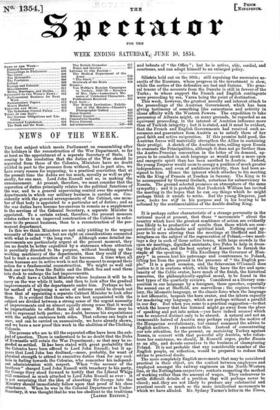NEWS OF THE WEEK.
Tirs first subject which meets Parliament on reassembling after the holidays is the reconstruction of the War Department, so far at least as the appointment of a separate Secretary of State. In coming to the resolution that the duties of the War should be separated from those of the Colonies, Ministers have no doubt yielded in part to the pressure from without, but in part also we have every reason for supposing, to a practical conviction that at the present time the duties are too much, morally as well as phy- sically, for one man. Lord john Russell said so, in making the announcement. At present, therefore' we must consider that the separation of duties principally relates to the political functions of the war, and to a general supervising control over the separated departments in which our military business is carried on. Con- sistently with the general arrangements of the Cabinet, one mem- ber of that body is appointed to a particular set of duties ; and as the war duties have become too onerous to remain as a supplement to the services of the Colonial Secretary, a separate Minister is appointed. To a certain extent, therefore, the present measure relates rather to an improved construction of the Cabinet in refer- ence to its present business, than to a reconstruction of the per- manent department.
In this we think Ministers are not only yielding to the urgent necessity of the moment, but are right on considerations connected with what is called "the long run. Although some detailed im- provements are particularly urgent at the present moment, they can no doubt be better expedited by a statesman whose attention is peculiarly directed to the purpose, without breaking up the working machinery of the departments, than they could if they had to wait a reconstruction of all the bureaus. A time when all those bureaus are in active work is not the moment to suspend their action for a fundamental reconstruction. We might as well call back our navies from the Baltic and the Black Sea and send them into dock to undergo the last improvements.
We shall have a Cabinet Minister whose business it will be to carry on the war while it lasts, and then to look after the gradual improvements of all the departments under him. Perhaps no bet- ter method of beginning a series of reforms could be struck out than that of appointing a separate Cabinet Minister to look after them. It is evident that those who are best acquainted with the subject are divided between a strong sense of the urgent necessity of improvements and an almost equally strong sense that it would be impracticable to effect them all at once. Mr. Ellice may be said to represent both parties ; no doubt, because his acquaintance with the subject embraces both sides. That reforms can begin at once, and can be carried on successively, we have already shown, and we have a new proof this week in the abolition of the Clothing Colonels.
The persons who are to fill the separated office have been the sub- ject of question. There is understood to be no doubt that the Duke of Newcastle will retain the War Department ; so that may be re- garded as settled. It bas been stated with great probability that the Colonies have been offered to Lord John Russell ; but it ap- pears.that Lord Sohn has declined,—more, probably, for want of physical strength to attend to executive duties than for any cool- ness in feeling towards the Colonies, who remember his independ- ent administration with respect. When "the accuser of the brethren" charged Lord John Russell with treachery to his party, Sir George Grey stood forward to testify that the Liberal Whigs gill remained as much attached to Lord John Russell as ever : it IS not surprising that the idea of absorbing Sir George into the Ministry should immediately follow upon that proof of his close attachment. When he was in the Colonial Department as -Under- Secretary, it was thought that he was too obedient to the traditions
and behests of "the Office "; but he is active, able, cordial, and courteous, and can adapt himself to an enlarged policy.


























